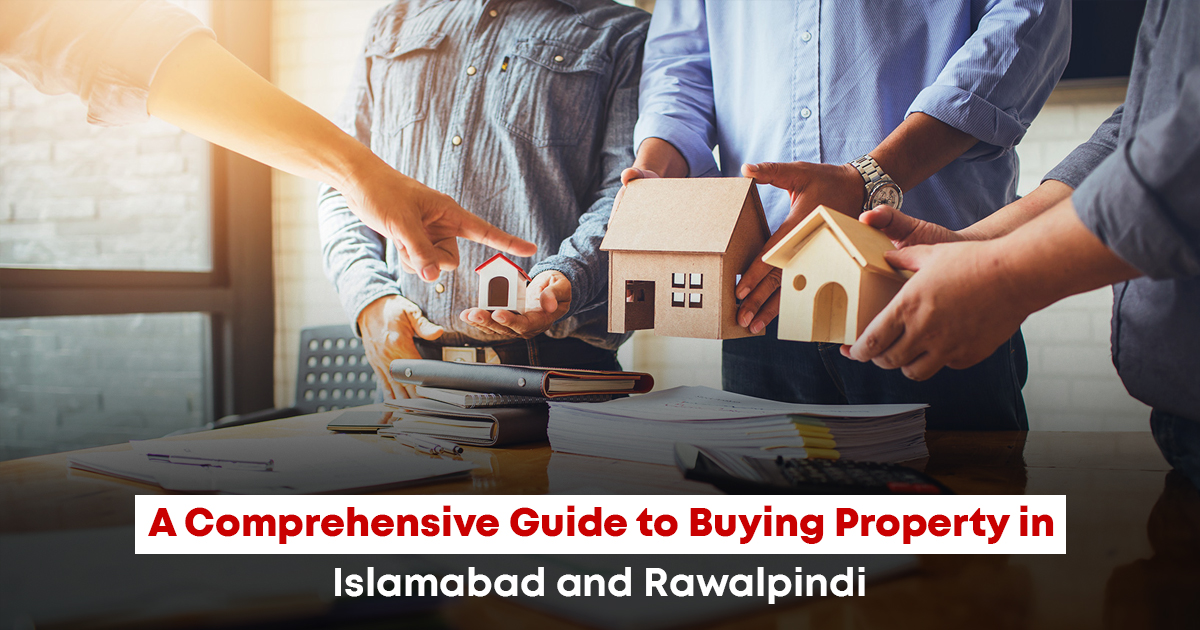
Buying property in Islamabad and Rawalpindi can be a rewarding investment, but it requires careful planning and consideration. Here’s an in-depth guide to help you navigate the process:
Understanding Your Requirements
- Purpose of Purchase: Determine whether you are buying for investment, personal use, or commercial purposes. Defining your goals will help streamline your search and decision-making process.
- Budget: Establish a realistic budget based on your financial capacity. Consider exploring financing options such as bank loans or installment plans offered by various housing societies in Islamabad and Rawalpindi.
Researching Locations
- Accessibility: Evaluate the accessibility of the location in relation to major roads, airports, educational institutions, healthcare facilities, and commercial areas. Proximity to key infrastructure can enhance the value and convenience of the property.
- Neighborhood: Research the safety, amenities, and overall reputation of the neighborhood. Consider factors such as crime rates, community engagement, and future development plans that can impact the long-term value of the property.
Selecting the Right Property
- Type of Property: Decide whether you are looking for residential plots, commercial plots, apartments, or houses. Each type has its own set of benefits and considerations. Residential properties are ideal for personal use, while commercial properties offer investment opportunities.
- Developer Reputation: Investigate the background and previous projects of the developer to ensure they have a track record of delivering quality projects on time. Established developers in Islamabad and Rawalpindi, such as DHA, Bahria Town, and Capital Smart City, are known for their reliable projects.
Legal Considerations
- Title Deed: Ensure the property has a clear title deed without any legal disputes. This is crucial to avoid future legal complications and secure your investment.
- NOC (No Objection Certificate): Verify that the property has a No Objection Certificate (NOC) from the relevant authorities such as the Capital Development Authority (CDA) or Rawalpindi Development Authority (RDA). An NOC ensures that the property complies with local regulations and is approved for development.
Finalizing the Purchase
- Documentation: Complete all necessary documentation, including sale agreements, transfer deeds, and registration papers. It is advisable to seek legal assistance to ensure all paperwork is in order and to safeguard your interests.
- Payment Plan: Negotiate a payment plan that suits your financial situation. Many housing societies in Islamabad and Rawalpindi offer flexible installment plans to make the purchase more manageable. Be sure to understand the terms and conditions of the payment plan to avoid any surprises.
Detailed Steps to Buying Property in Islamabad and Rawalpindi
Step 1: Define Your Objectives
- Investment Goals: Are you looking for a property that will appreciate in value, or are you more interested in generating rental income? Your investment goals will influence the type of property you should buy.
- Personal Preferences: Consider factors such as proximity to work, schools, and amenities. If you plan to live in the property, these factors will greatly influence your decision.
Step 2: Research the Market
- Property Listings: Utilize online property portals, real estate agents, and classified ads to explore available properties. Websites like Zameen.com and OLX Pakistan are popular platforms for property listings.
- Market Trends: Stay informed about market trends and property price fluctuations in Islamabad and Rawalpindi. This will help you make informed decisions and negotiate better deals.
Step 3: Site Visits and Inspections
- Visit Properties: Schedule site visits to inspect the properties in person. This will give you a better understanding of the property’s condition, location, and surroundings.
- Professional Inspection: Consider hiring a professional property inspector to evaluate the structural integrity and condition of the property. This can help identify any potential issues that may not be immediately visible.
Step 4: Legal Verification
- Check Legal Status: Ensure the property is legally sound by verifying its ownership and checking for any encumbrances or legal disputes. This can be done through the local land registry office.
- NOC Verification: Confirm that the property has all the necessary approvals and No Objection Certificates (NOC) from relevant authorities. This is essential to avoid any legal complications in the future.
Step 5: Financial Planning
- Assess Financing Options: Explore different financing options such as bank loans, mortgage plans, and installment plans offered by housing societies. Compare interest rates and repayment terms to find the best option for your financial situation.
- Down Payment: Prepare for the down payment, which is typically a percentage of the total property price. Ensure you have the required funds available to secure the property.
Step 6: Negotiation and Agreement
- Price Negotiation: Negotiate the property price with the seller or developer. Having a good understanding of market rates and property value will strengthen your negotiating position.
- Sale Agreement: Once a price is agreed upon, draft a sale agreement outlining the terms and conditions of the sale. This should include details such as the payment schedule, possession date, and any additional terms agreed upon by both parties.
Step 7: Transfer of Ownership
- Transfer Deed: After finalizing the sale agreement, the next step is to transfer the ownership of the property. This involves signing a transfer deed and registering the property in your name at the local land registry office.
- Payment Completion: Ensure that all payments are made as per the agreed schedule. Obtain receipts and documentation for all transactions to maintain a clear record.
Step 8: Possession and Handover
- Possession Letter: Once all legal and financial formalities are completed, obtain a possession letter from the seller or developer. This officially grants you possession of the property.
- Property Handover: Conduct a final inspection of the property before taking possession. Ensure that any agreed-upon repairs or modifications have been completed to your satisfaction.

